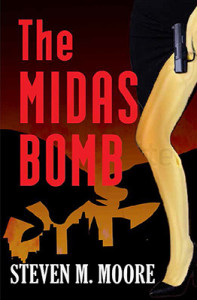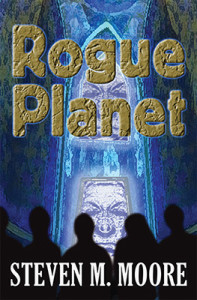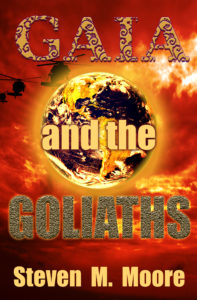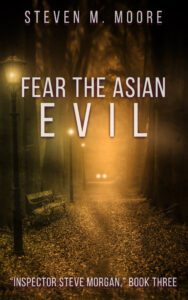A villain’s long criminal career…
 I have a few series—seven, not counting A. B. Carolan’s—and Vladimir Kalinin has the role of arch-villain in four of them and in two bridge books between them. He also influences many of the events in a fifth, because five of the seven series are on the same fictional timeline that starts with The Midas Bomb and ends with Rogue Planet. (Both have paper editions if you’re interested.) I don’t know if that’s a new record for one fiction author, but it’s certainly evidence for Vladimir’s long criminal career.
I have a few series—seven, not counting A. B. Carolan’s—and Vladimir Kalinin has the role of arch-villain in four of them and in two bridge books between them. He also influences many of the events in a fifth, because five of the seven series are on the same fictional timeline that starts with The Midas Bomb and ends with Rogue Planet. (Both have paper editions if you’re interested.) I don’t know if that’s a new record for one fiction author, but it’s certainly evidence for Vladimir’s long criminal career.
 Why do I keep returning to him? (Most recently, I did that in the “Inspector Steve Morgan” series, located midway along that timeline.) It’s complicated! He’s a complex and interesting villain, for one thing. While not afraid to commit violence to further his many nefarious schemes, he shows flashes of caring and compassion that could make readers used to simpler villains scratch their heads. While using his genius to gain influence and riches, a true master of the art of the deal, he also sometimes exhibits admirable feelings for his fellow human beings that can be surprising. His long friendship with Sean Cassidy, the old ex-pat Irish bomber, for example, which lasts all the way to No Amber Waves of Grain, is as solid as any friendship between strong personalities can be. In fact, they’ve formed more of a close partnership in which they trust each other more than their many accomplices.
Why do I keep returning to him? (Most recently, I did that in the “Inspector Steve Morgan” series, located midway along that timeline.) It’s complicated! He’s a complex and interesting villain, for one thing. While not afraid to commit violence to further his many nefarious schemes, he shows flashes of caring and compassion that could make readers used to simpler villains scratch their heads. While using his genius to gain influence and riches, a true master of the art of the deal, he also sometimes exhibits admirable feelings for his fellow human beings that can be surprising. His long friendship with Sean Cassidy, the old ex-pat Irish bomber, for example, which lasts all the way to No Amber Waves of Grain, is as solid as any friendship between strong personalities can be. In fact, they’ve formed more of a close partnership in which they trust each other more than their many accomplices.
 But Vladimir also obsesses about revenge, a very human emotion. His long pursuit of Putin’s oligarchs is aimed at paying them back for forcing him to flee his native Russia when Putin grabbed power there. He’s also always thinking about revenge against those NYPD cops, Chen and Castilblanco, although he respects them and others for having thwarted him. He does eventually manage to take revenge against some oligarchs and other enemies, in particular the oligarch in Gaia and the Goliaths and the Korean industrialist who killed his protégé in No Amber Waves of Grain. Yet he’s not above trying to assassinate a few US presidents—he succeeds with a second attempt on one in Soldiers of God.
But Vladimir also obsesses about revenge, a very human emotion. His long pursuit of Putin’s oligarchs is aimed at paying them back for forcing him to flee his native Russia when Putin grabbed power there. He’s also always thinking about revenge against those NYPD cops, Chen and Castilblanco, although he respects them and others for having thwarted him. He does eventually manage to take revenge against some oligarchs and other enemies, in particular the oligarch in Gaia and the Goliaths and the Korean industrialist who killed his protégé in No Amber Waves of Grain. Yet he’s not above trying to assassinate a few US presidents—he succeeds with a second attempt on one in Soldiers of God.
 Many literary critics see authors’ villains as representations of authors’ dark sides. That’s not the reason Vladimir has appeared in so much of my fiction, though. Instead, he’s evidence for my belief that no one is purely good or evil. That yin-yang simplification so ubiquitous in fictional fluff isn’t justified because human beings are so complex. If fiction is to seem real, its plots and characters must both seem real as well.
Many literary critics see authors’ villains as representations of authors’ dark sides. That’s not the reason Vladimir has appeared in so much of my fiction, though. Instead, he’s evidence for my belief that no one is purely good or evil. That yin-yang simplification so ubiquitous in fictional fluff isn’t justified because human beings are so complex. If fiction is to seem real, its plots and characters must both seem real as well.
A good thesis for an MFA graduate student (do they even do them?) might be following Kalinin’s career from The Midas Bomb to Soldiers of God and on to his influences beyond that, i.e. following my extended timeline. Because I don’t write all these novels in sequential order, that wouldn’t be a trivial task. And that student might prove that my development of Kalinin, if followed sequentially along that fictional timeline, is as complex and chaotic as his character seems to be!
***
Comments are always welcome. (Please follow the rules on my “Join the Conversation” web page. If you don’t, your comment is considered spam.)
 Fear the Asian Evil. This third book in the “Inspector Steve Morgan” series might seem ripped from the headlines after reports that President Biden strongly warned President-for-Life Xi about invading Taiwan. The book deals more with China’s long-standing policy of industrial espionage—they’d rather steal ideas than have to invent them—and fomenting unrest in western democracies. While it starts out as a typical police procedural—the sister-in-law of Morgan’s sergeant is shot—it acquires a spy-fi flavor that goes far beyond Christie’s typical British-style mysteries. Available wherever quality ebooks are sold (but not on Amazon).
Fear the Asian Evil. This third book in the “Inspector Steve Morgan” series might seem ripped from the headlines after reports that President Biden strongly warned President-for-Life Xi about invading Taiwan. The book deals more with China’s long-standing policy of industrial espionage—they’d rather steal ideas than have to invent them—and fomenting unrest in western democracies. While it starts out as a typical police procedural—the sister-in-law of Morgan’s sergeant is shot—it acquires a spy-fi flavor that goes far beyond Christie’s typical British-style mysteries. Available wherever quality ebooks are sold (but not on Amazon).
Around the world and to the stars! In libris libertas!
